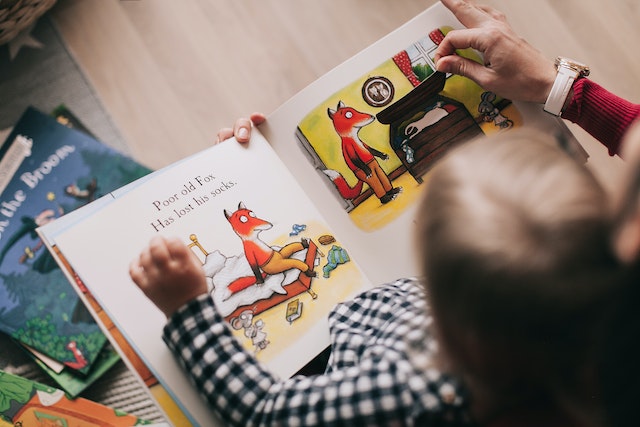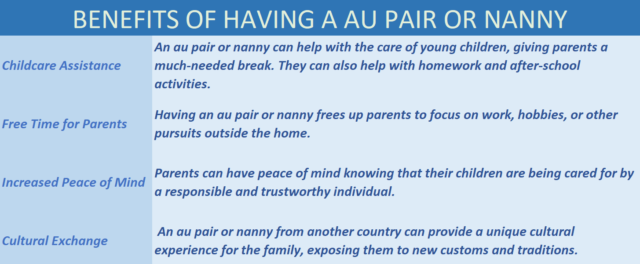An au pair can provide affordable childcare but may require more flexibility from their host family than a nanny would. Conversely, a nanny offers more extensive services that may be better suited for families who need round-the-clock care.
Au pair
An au pair is a live-in caregiver who typically comes from another country to care for children in exchange for room, board, and a small stipend. Au pairs usually work around 30 hours per week and often take on additional responsibilities such as light housekeeping and running errands.
Nanny
(Photo by Alex Green on Pexles.com)

Nannies are also in-home caregivers, but they do not live with the family. Nannies typically work longer hours than au pairs (40+ per week) and are paid an hourly wage or a salary. Like au pairs, nannies can also be responsible for light housekeeping, running errands, and other child-related tasks.
Au pair Vs. Nanny – Key differences
(Photo by Lina Kivaka at pexles.com)

An au pair is a live-in child care provider who typically comes from another country and is sponsored by a family to come live with them. An au pair generally has some child care experience and is expected to perform duties such as light housekeeping, cooking, and running errands in addition to providing child care. A nanny is a professional childcare provider who does not live with the family but comes to the family’s home to provide child care on a daily basis. A nanny usually has extensive child care experience and may also have additional training in early childhood education or special needs care. A nanny is expected to provide full-time child care and may also be responsible for tasks such as laundry, grocery shopping, and meal planning.
Au pairs typically live with their host families and become like a member of the family, while nannies typically do not live with their families and have more of a professional relationship. Au pairs also tend to be younger than nannies and may be studying or looking to learn about a new culture, while nannies are usually older with more childcare experience.
Au pairs typically work shorter hours than nannies (usually around 30 hours per week), but they also receive room and board as part of their compensation. Nannies, on the other hand, usually work longer hours (40 or more per week) but do not receive room and board. Both au pairs and nannies typically get paid vacation days, sick days, and holidays off.
One of the main benefits of having an au pair is that they can provide flexible childcare. For example, if you need someone to watch your kids for a few extra hours one day or one evening per week, an au pair can usually accommodate that request. Nannies, on the other hand, typically have set schedules that are harder to deviate from.
What is the difference between nanny and babysitter?
A nanny is typically a live-in caregiver who provides long-term care for children. Another option is to hire a babysitter, who is usually an older teenager or young adult who provides short-term care for children on an as-needed basis. So, what’s the difference between nannies and babysitters?
Nannies are usually more experienced than babysitters and are often responsible for more than just watching over children. They may be responsible for tasks such as preparing meals, helping with homework, transporting children to and from activities, and providing general child care. Nannies typically work full-time hours and live in the family’s home, while babysitters typically work part-time hours and do not live in the family’s home.
So, when choosing between a nanny and a babysitter, it’s important to consider your family’s needs and preferences. If you need regular child care during typical working hours, then a nanny may be the best option. However, if you only need occasional child care or prefer someone who isn’t living in your home, then a babysitter may be a better fit.

Do you need qualifications to be a nanny?
No, you don’t need qualifications to be a nanny, but many families prefer candidates who have experience in child care or a related field. There are many ways to get the training and experience you need to be a successful nanny. You can take classes, participate in online training programs, or get a job in a child care setting. Many nannies also have CPR and first aid training.
Do you need qualifications to be a au pair?
In order to become an au pair, you do not need any specific qualifications. However, there are a few things that would make you a more ideal candidate. For example, many host families prefer au pairs who have some experience working with children, as well as basic child care skills. Additionally, being able to speak another language is often seen as a plus, as it allows for immersion in another culture. Finally, having a driver’s license is also generally required, as you will likely be responsible for driving the children to and from activities.
Who will suit you; au pair or nanny?
If you are looking for child care but are not sure whether an au pair or nanny is the right fit for your family, there are a few things to consider. First, decide what type of care you need. An au pair typically lives with the family and provides live-in child care, while a nanny does not live with the family and provides hourly or daily child care.
Next, consider your budget. Au pairs typically cost less than nannies because they receive free room and board in addition to a weekly stipend. Nannies, on the other hand, are paid an hourly or daily rate based on their experience and qualifications.
Finally, think about what type of person you want caring for your children. An au pair is usually a young person from another country who is looking to experience life in America, while a nanny is often an experienced childcare professional. If you are unsure which option is best for your family, there are many resources available to help you make a decision.
Frequently asked questions about au pairs and nannies
What is male nanny called?
A manny is simply a male nanny. He provides the same in-home child care services as a nanny, but he’s a guy!
While the vast majority of au pairs and nannies are women, there are an increasing number of men entering the field. If you’re looking for a male nanny, also called a manny.
Does an au pair cook?
An au pair is expected to help with light housework and cooking. This includes tasks such as vacuuming, dusting, laundry, and meal preparation. The number of hours spent on these activities will vary based on the family’s needs, but typically an au pair works around 30 hours per week. Families often provide their au pairs with a food allowance to cover the cost of groceries.
What is the age limit for an au pair?
There is no definitive answer to this question as the age limit for an au pair can vary depending on the country in which you are looking to work. In general, most au pair programmes will require you to be between 18 and 30 years old, although some may accept applications from those aged 16 or 17 with parental consent. It is always best to check with the specific programme or agency you are interested in to find out their age requirements.
Do nannies cook and clean?
Yes. Their duties typically include cooking, cleaning, and running errands in addition to childcare. Some nannies also handle light housekeeping tasks such as laundry and vacuuming. Basically, their job is to make your life easier!
What should nannies not do?
There are a few things that nannies should not do in order to maintain a professional and respectful relationship with their employers. First, nannies should not overstep their boundaries and try to parent the children in their care. Instead, they should focus on providing quality child care and following the parents’ wishes for their children. Additionally, nannies should not neglect their own personal hygiene or appearance. Finally, nannies should not gossip about the family they work for or share confidential information about the family with anyone outside of the household.
Can a nanny ware a dress?
A nanny can wear a dress if she would like to, but it is not a requirement. An au pair is required to wear a uniform when working.
Featured Image By – Photo by Zach Vessels on Unsplash








